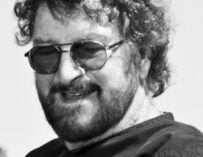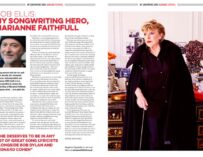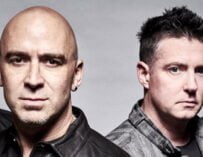
Robyn Hitchcock: playing San Francisco’s Hardly Strictly Bluegrass festival in 2012. Photo: Wikimedia Commons/David Becker
In the latest episode of the podcast, their guest unpicks an array of Hitchcockian classics in his own inimitable style
For their 96th episode, Liverpool-based podcasters of all things songwriting, Sodajerker, welcomed an English singer-songwriter and guitarist whose career has spanned four decades, and whose witty, surreal, endlessly inventive songs and spellbinding live performance have won him a devoted cult following.
Robyn Hitchcock was born in West London in 1953 to an artistic family – his father Raymond was a writer and painter, who wrote the book Percy – but Robyn gravitated more towards music. He received his first guitar aged 14 and taught himself the basics by playing along to Bob Dylan records, and was heavily influenced by The Beatles, Syd Barrett and The Byrds – he wrote his first song aged 17.
In 1976, he formed The Soft Boys and recorded two albums including 1980’s seminal Underwater Moonlight before disbanding in 1981, although there have been several intermittent reunions since then. The same year, Robyn released his debut solo album Black Snake Diamond Röle and then in 1984 he recorded the album many consider to be his masterpiece, the mainly acoustic I Often Dream Of Trains.
Robyn has maintained a steady output since, both solo and with The Venus 3 whose lineup includes R.E.M.’s Peter Buck. Most recently, he collaborated with Australian singer and broadcaster Emma Swift. Here are the highlights of Sodajerker’s chat with the brilliant Robyn Hitchcock…
On the way over we were listening to Life Is Change and Love Is A Drag from the new stuff that you released in October and that features Emma Swift. Is there a whole album of that stuff on the way – a sort of Hitchcock/Swift record do you think?
“Not at our rate of progress, we’ve only managed two singles. It is very difficult to work, to agree on anything. We’re a couple and we can just about deal with the order in which we do things; in working terms it’s extremely difficult. She works on things extremely slowly and I just like to chuck them out. What we like is very different too, just the sort of sound we go for – he likes things quite sparse and I tend to like to clutter things up. What I think is very good about it is our voices. We are both lead singers so we’ve been doing a lot lately. I think we sing better now than we did on the records that Norman Blake kindly recorded and produced. He did manage to get us there doing it so that’s an achievement.”
Is there an element of co-writing involved or is it mainly you?
“I started them, then Emma finished them, I suppose is the easiest way of putting it or adapted them or whatever. It certainly ended up differently than if I finished them. They’re probably more beautiful as a result. In Britain, it’s come out as a green vinyl, so that’s nice. I have always wanted a green record and here it is. So thank you, I am glad you like it, it’s good. Hopefully Emma and I will come up with something in the next couple of years, by which time she would have done her next record and I probably would have churned out loads of stuff.”
With you being on tour does that sabotage what you may do or are you one of these people who can write an album in a hotel room?
“If I’m on my own then I do; I don’t know. Em tends to take notes at mysterious times; I think I do but I’m never aware of it, then I look in a notebook and notice all these lyrics I have no memory of writing. Yes, it’s a constant percolation.”
You must be quite prolific in capturing those bits and pieces because it’s more than 20 albums now isn’t it?
“Yeah! Well I like something to show for my time [laughs]. Possibly I should have released less and spent more time honing what I do like Nick Lowe, I always think I’m Nick’s psychedelic little brother. He’s a lovely chap and there are sort of similarities (between us). We were neighbours in West London for quite some time. I think, to me, he came of age musically before The Beatles, whereas I came of age when The Beatles hit. His songs have got that sort of element of 1959 in them. I don’t think The Fabs altered his molecular structure. I know he loves them, as do I, but whereas my musical DNA is completely based around The Beatles, I haven’t done anything or written anything that one have them wouldn’t have written or wouldn’t have considered writing. Even though I love Captain Beefheart and Syd Barrett, The Incredible String Band and The Doors, I still essentially when I put a song together and put harmonies together, all of that is Beatle.
“I think of The Beatles as an academy that had three professors, then spread outwards and now there’s all these people like Andy Partridge, Elvis Costello and myself from that generation, or someone like Kathryn Williams, who’ve been to that school. They went to Beatles school. You hear it in Radiohead or something and a minor 6th will come through. Not that the Beatles invented the minor 6th but it was something that they all did. Those diminished chords will crop up. Life Is Change, to me, sounds like a John Lennon demo or a George Harrison demo from the wasteland of the 70s.”
When you write do you make time to write, is it kind of a daily practice or is it just something that happens as and when?
“No, I always feel guilty about writing; I do it instead of administration. What I call E.L.A.: Electronic Life Admin. Emma and I spend a lot of time doing ELA, writing songs is something I do for kicks. Actually what I should be doing is my accounts, emailing people or something like that. I just feel like, it’s like Lennon and McCartney. They would sack or bunk off school, and instead would write. I feel much the same. I have never sat down and thought, ‘I better write some songs’ or ‘I have a record deal’. Things like writer’s block is unknown to me, who gives a sh*t? a) Nobody needs a record b) I have enough songs stockpiled to come out long after the apocalypse.
“I’m planning to have myself made as an app to come out on the iPhone 13 so that when I’m no longer current, in human form, the Robyn Hitchcock song will go on writing songs and will continue to update itself. It’s my attempt to become the academy of Robyn Hitchcock. It is my attempt to transcend time in some way, which is one of the main functions of art, to pass the baton. We live and die but our culture carries on, it adapts and mutates like a virus. One of the joys of being an artist is that you can contribute to it long after you are personally dust with all your friends and enemies. Yeah, I’m aiming for the big one.”
I heard you say somewhere that you are a seasonal songwriter, that you don’t write a lot during the winter months.
Yeah, I always thought that, in the early days I’d look for patterns and I’d think ‘gosh I don’t write much between October and May but there’s been periods where I’ve knocked out 8 songs in January. There are periods when you get buds on the trees in January but the frost get’s them. The harvest time/the autumn is probably the best time but I haven’t been bothered to finish anything this year as my record is done but not actually mastered. It’s all supposed to happen in the next couple of weeks. You know I don’t need more songs; my live act, if I didn’t play anything after 1990, I would be just as happy.
“I’m an oldies act, like it or not, like Bryan Ferry or McCartney. Everyone’s an oldies act except Dylan (Bob) because he’s so perverse. He’s there because of what he did 50 years ago but the paint doesn’t dry on Dylan. The old songs just become shapeless with Dylan. If you want to get a performance out of him he’s got to perform stuff from the last 20 years; the old stuff doesn’t mean as much to him. I’m jealous that he’s so good he tries to f**k them up or something. A good Dylan show will comprise of songs that haven’t melted yet from the last 20 years but everyone else you’re going to see Bryan Ferry do a word-for-word rendition of Love is the Drug. He still hits the high notes. Me, I put in new songs, but I know what resonates with people most is older material because it’s just been around longer. Same to me if I hear a song from 30 years ago or before, it just hits in a different way.
It seems like a lot of your songs come from that interaction between you and the guitar. I know you play piano, but when I hear something like Trouble in your Blood (or something like that) it feels like that couldn’t have come from any other method than you sitting and strumming a guitar. Would that be right?
“Yeah. That’s the thing, that’s why I’m so old school. I play a bit of piano but there has to be a piano around to actually play, whereas I have always got a guitar. So, I play guitar and something either comes to me or I open one of my notebooks and actually just sing through them; I write down what key it’s in, if I can remember the tune the next day I play it, if not it’s gone. We were listening, coming up, to this BBC Radio 2 ‘Pick of the Pops’ run-down list and they had 1968 and 1988; what was interesting was that the majority of the songs in the 60s were made up on the guitar or piano and the vocal was very big and central. The vocals sat there like a bird in a nest.
“Then, 20 years later, the songs were all written on machines; they all were written with sequencers and written to a click, keyboard and all that sh*t. The vocal became buried, it’s about 1/3 as loud and what you’re listening to is the sound. People have different worlds, different drugs and different forms of entertainment. By the 1980’s a lot of people were on E, in the 60’s it was coffee, cigarettes and a little bit of weed. Maybe that had something to do with it.

Robyn Hitchcock
“I was absolutely alienated by the way music writing went in the 80s and it hasn’t really come back. There’s a whole Americana sideshow, which Emma and I both belong to – although neither of us would say we belong to the Americana ‘genre’ – simply because it revolves around writing with guitars. Hence, Jason Isbell or John Moreland people like Lucinda Williams, who’s been around almost as long as I have – she’s my age. Nothing that has happened after 1976 has shaped Americana; it feels like Americana is the world before 1976.
“We live in Nashville and there are a lot of great musicians playing in the bars. We are walking distance from four venues and it’s really good stuff; the musicians just roost on the fences there; you can just can’t help but see them and talk to them. It’s all pre-1976, which doesn’t bother me, because I’m really in a way pre—1970 in way I suppose. I think Emma is really Laurel Canyon in ’72, she always says that is her epicentre. My epicentre is obviously 1966/1967. I’m not recreating the feeling of that, because the feeling was very much of its time, like all zeitgeists it ended up evaporating. The style and the musical approach, I’ve pretty much hung on to.”
Is it a challenge to keep thing fresh on the guitar, having written so many songs?
“Surprisingly, no it hasn’t. I think because I mess around with the tunings; in a coy way, I will drop the B string down to an A and suddenly I have got a completely different sound. On The Man Upstairs, I think I have two or three different tunings in there. I don’t tend to play much of it live because they are in tunings I wouldn’t normally play. Trouble in your Blood is in a different tuning, San Francisco was in a different tuning. To keep the marriage fresh you, you have to change the costume and I’m still finding new chords; I’m still finding new ways of playing, I’m still fascinated by how much of a drone you can get on an A. Are you both guitarists?”
I’m a guitarist, Brian’s mainly a bassist.
“I suppose you can mess around with the tuning on a bass, it’s a bit more subtle but you can. It’s just a way of keeping it fresh, as well as changing the strings fairly regularly so it doesn’t sound too dead. Guitars are like computers, they have their moods. You’ll just sometimes pick up the guitar and there’s something there and sometimes there isn’t.”
Well the last album had lots of covers, like songs from The Doors and that sort of thing? Do other people’s songs have to have certain qualities for you to want to sing them?
“Yes, yes. They all have to be songs I wish I’d written. That record, because I wanted to make an album with Joe Boyd, I didn’t have very much material and Joe and I were free, Joe suggested making one-half cover and the other one-half songs I had written. I wanted to do some well-known ones, like a Judy Collins number from 1967 which Joe remembered, and also do some not so well-known ones too. I did songs from The Doors, Roxy Music and I also did a song by Grant-Lee Phillips. Then I put in 5 of my own that I had just written. So yes, if I cover a song, you should be pretty certain that I wished I had written it, but I don’t usually release them. Sometimes, in the set, I’ll do my own songs in the set and I’ll do the covers in the encore like going through my record collection.”
In terms of your influences, you mentioned people like Syd Barrett, The Beatles, Dylan… Did you study the songcraft of those people meticulously or did you naturally internalise a lot of that stuff?
“The latter, I just kind of absorbed it. I don’t really study anything. Things either take me over or they don’t. I think all those entities I absorbed to the point where they became sub-personalities. I would write a John Lennon song or a Syd Barrett song, I’ve written a lot of Bryan Ferry songs; I wish I could sell some to him. I mean they aren’t ‘their’ songs because I’ve written them, there’ll be some lyrics in there that they wouldn’t have used, but what I think of as the musical feel, you can see as me trying to channel one of these sub-personalities I have absorbed. Sometimes I think there’s no ‘me’ at all, I am just a Peter Sellers character, simply full of other people. I’m not aware of having a style or a sound particularly. I suppose, even if I am a collection of other people, then I am composed of people I like. I am a Venn diagram or something, that’s what I am.”
You are the De Niro of songwriting. When we had Andy Partridge on he spoke a lot about instinct; he didn’t want to know the name of any chords and he wasn’t interested in that sort of thing. You’ve mentioned you’ve written with him. What was that like? Are your sensibilities quite similar?
“Yeah, but we’re both good at starting things and not finishing them. We had a cassette of six songs we started, but we misfired in getting hold of another and seeing each other. He thought I lost interest and I tour. The thing is I live by touring and Andy won’t play live; he makes his money through royalties and other stuff he does. He’s mostly at home in Swindon, in his shed, and I’m usually somewhere else, in fact I no longer live in Britain. I’m hoping we can intersect and finish some stuff off. We both come up with ideas very fast and I’m not very technical. I sort of know what a minor 6th is, but I could be wrong. I’m not embarrassed for knowing the names of chords, but I could be wrong.”
Do you tend to get on a roll and produce things very quickly or do some songs hang around for years before you get round to finishing them?
“Once you’ve landed a song, I suppose it’s like catching a fish; you’ve either caught it or you haven’t. You don’t tend to catch half a fish and hope the rest of it will come through some months later. There’s a point when I know I’ve got a song in essence, but it might take quite a long time to finish it off. There’s a song Adventure Rocket Ship, I spent about a year trying to finish that because each verse is a little bit different from the other anyone. I worked conscientiously on that. Sometimes your perception will come to you and other times you have to re-write what comes through. I abandon quite a lot. The worst thing is abandoning a song after so much work, but there comes a point where you have to decide whether you lose interest on a song.”
So you don’t typically have a melody before the word?
“That’s something that’s changed over the 40 years. I never used to know about melody, I used to guess chords, and found through help from musical friends I could find melodies that flowed. I have tunes now with no lyrics, over time I have become less interested in words and more interested in music. Having spent a lot of time as a musician, I’m much more interested in that stuff now. I’m now a pretty good acoustic guitar player, I’m not an electric virtuoso nor would I want to be because that’s a redundant path really. It’s like throwing a pineapple up in the air and being able to skewer it on a sword, it’s a great trick but of how much use is it. Playing acoustic I love, I’ve spent the last 50 years with an acoustic guitar, next March it will be 50th anniversary since I bought my first acoustic guitar. I can’t remember a time where I didn’t play guitar.”
You mentioned My Wife and My Dead Wife, which is what I wanted to bring up. I know it’s not necessarily one of your favourites, but I always loved that really unusual image. I just wondered if you could talk about how that came about?
“I don’t know. I was riding a bicycle in the Channel Islands, in a place called Sark where there are no cars. The title just popped into my head. A year later I went to cafe in North London, with my notebook, wrote the words, took it home and put a tune to it, then I took it to the guys I played with (Morris and Andy). Andy told me to play it a different way, and he was right. It was very simple like a lot of my songs. I wrote it then lived it straight afterwards.”
Do Policemen Sing is another one we wanted to ask about.
“I was still in The Soft Boys at the time. I remember just beginning to sing it and they began to play along with me. I went away and wrote some words to it. I don’t think we recorded it but when I was making my own record, Matthew Seligman added a much tidier bass-line to it. It was all over the place with The Soft Boys but he added some bits. The dream for any rhythm section was to play with David Bowie. Matthew actually did Live Aid with Thomas Dolby, who provided backing musicians for Bowie. He realised his dream. It was the beginning of the ‘rhythm section age’ in the way the bass and the drums got louder in the 80s. A snare you could land a plane on, which as a guitarist I was quite miffed about. I liked it when it got more guitar heavy in the 90s.”

Internationally renowned songwriters are queuing up to be interviewed by Sodajerker, who now have over 90 episodes under their belt. Established in 2012 by Liverpudlian songwriting duo, Simon Barber and Brian O’Connor, the Sodajerker On Songwriting podcast has welcomed guests including Paul Simon, Ben Watt, Justin Currie, Willy Russell, Lamont Dozier, Neil Sedaka, Johnny Marr, Ben Folds Five, Billy Bragg, Richard M Sherman, Neil Finn, Suzanne Vega, Jimmy Webb, Rufus Wainwright, KT Tunstall, Dan Gillespie Sells and many more.
To find out more about Sodajerker and their work, or to download their podcasts – including the full 49-minute interview with Robyn Hitchcock – go to www.sodajerker.com. You can also connect with them on Facebook or Twitter, or download the podcasts from iTunes.































Related Articles